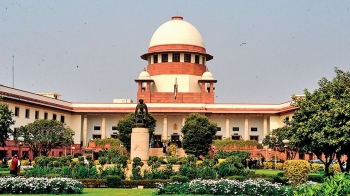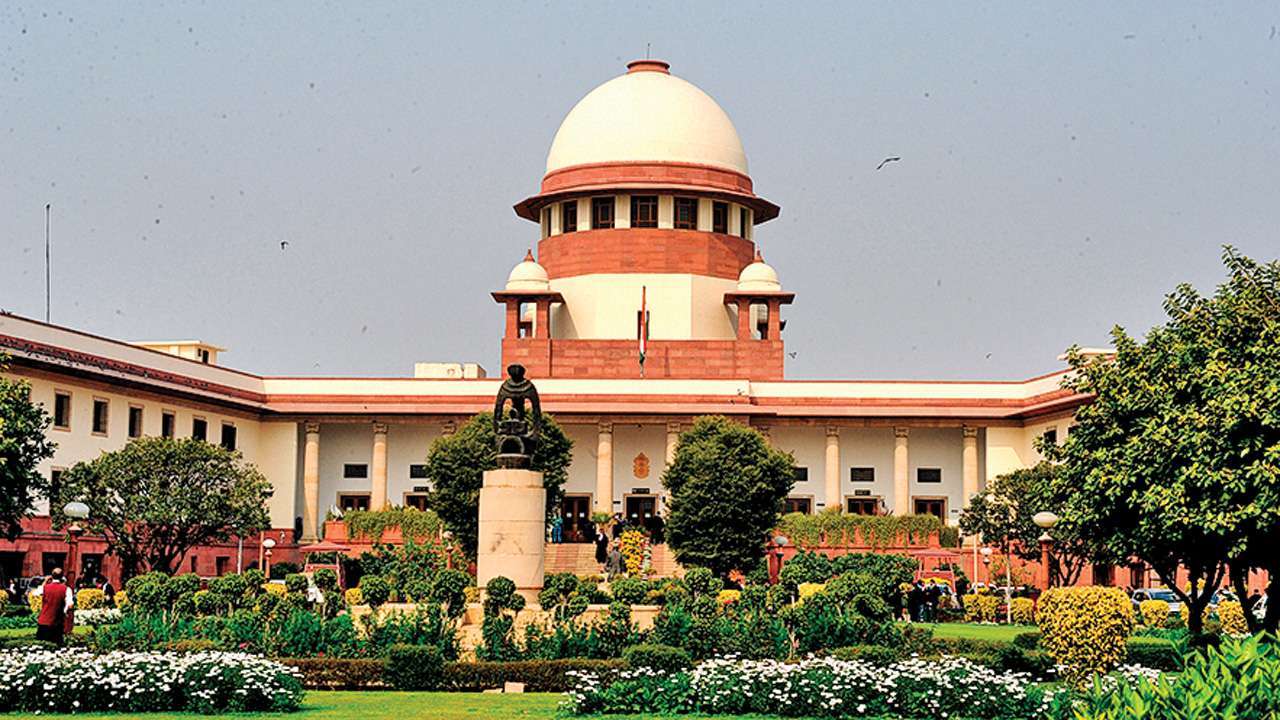
.png) Pauly Muricken
Pauly Muricken

Can reservation cross the “lakshman rekha” or boundary limit of 50 % in jobs and education? This seminal issue is being examined by the Supreme Court once again in Dr. Jaishri Laxmanrao Patil’s case in the midst of the challenge raised against the Maratha reservation law which provides for 12% quota for the Maratha community in education and 13% in jobs, besides the already earmarked 50% social-based reservation. The law is being questioned as offending the constitutional ceiling limit of 50% evolved in Mandal case (1992) as applicable to reservation in education and jobs.
Constitutional Vision
The Indian Republic was founded 71 years ago with the four-fold objective of securing to its citizens Justice, Liberty, Equality and Fraternity. Statesmen of the highest order, the like of which this country has not seen since, belonging to the fields of public life, law and politics fashioned the great instrument of social transformation and change, the Constitution of India. They did not rest content with evolving the framework of the State. They also pointed out the goal and the methodology for realizing that goal. In the Preamble, they spelt out in clear terms the goal. Through the scheme on Fundamental Rights and Directive Principles of State Policy, they elaborated the methodology to be followed for reaching that goal.
The Constituent Assembly was the representative of all sections of society. It consisted of men of vision, conscious of the historic but difficult task of having an egalitarian society, from out of a bewildering mass of religions, communities, castes, races, languages, beliefs and practices. They knew their country well. They understood the society perfectly. They were aware of the historic injustices and inequities that plagued the society. They realized the imperative of redressing them by constitutional means. They also took note of ignorance, illiteracy, and above all mass poverty surrounding the citizenry.
French Revolution
Liberty, Equality and Fraternity were the battle cry of French Revolution. These principles stand as the motto of the Constitution of India. Equality has been and is the single greatest craving of all human beings at all points of time. It has inspired many great thinkers and philosophers. All religions and political schools of thought swear by it.
The doctrine of equality has many facets and dimensions. It is a dynamic and evolving concept frequently applied, also for uplifting the weaker and marginalized sections, which include “backward classes of citizens” in whose favour special enabling provision envisaging reservation is contemplated. This power is ultimately conferred on the State as a constitutional entity. It is a special constitutional protection available to the weaker sections against the ‘persisting effects of past discrimination’.
The 50% Rule
The 50% rule carved out by a nine-judge bench of the Apex Court in the landmark verdict in Indra Sawhney (Mandal case) appears to have become more a rule of caution and prudence, rather than a binding rule, with the passage of time. Perhaps this may be for the reason that even while the Judgment has evolved the ceiling limit of 50% rule, as applicable to reservations, it has also permitted relaxation of the rule to meet an exceptional situation or an extraordinary circumstance.
Though the Court has not deliberated much on what is an exceptional situation or an extraordinary circumstance for breaking the ceiling nor has given an exhaustive illustration, such an extent of level playing field became necessary for bringing the far-flung and remote areas of population into the mainstream of national life.
The constitutional justification for the ceiling limit is that reservation made by the State should be reasonable. It should not defeat or nullify the main rule of equality, the golden thread permeating the fabric of the Constitution. While it is not possible to predict the exact permissible percentage of reservation, it can be stated generally and broadly that reservation should be less than 50%.
Protective Discrimination
Questions pertaining to reservation are slowly losing its constitutional significance and are travelling close to the frontiers as a political question, making the power of judicial review limited. The approach of the Apex Court in Mukesh Kumar’s case (2020) holding that there is no fundamental right to reservation in promotions and the constitutional provisions relating to reservation are only enabling provisions that enables the State to choose the path of reservation in its discretion shows the candid reluctance of the Court in intervening in the reservation scenario.
The impact of the Constitution (102nd Amendment) Act, 2018 that introduced Article 342A cannot be blindly ignored. The above provision has in a way deprived State Legislatures of their competence and discretion to specify the backward communities within their State jurisdiction. This may be seen as an attempt to knock down the powers of the State Legislature to include backward communities in the State list of backward communities. It disturbs the federal policy and structure envisaged in the Constitution.
The validity of the Maharashtra quota law breaking the ceiling limit of 50% also requires to be addressed in the contextual background of the Constitution (102nd Amendment) Act, 2018 that has in a way taken away and abrogated State’s power to legislate and classify in respect of backward class of citizens. The further probe would be on the question as to whether the special reservation provision for the Maratha community, in addition to the already existing 50% social-based reservation justifies the presence of an extraordinary situation or an exceptional circumstance for relaxing the ceiling limit rule.
Revisiting Mandal
The Constitution (103rd) Amendment Act, 2019 has led to a situation necessitating a revisit of the Indira Sawhney verdict in view of the changes brought by the amendment to the Constitution of India. It may perhaps warrant altering the very structure and composition of reservation in the light of changing social conditions.
The 103rd Amendment Act added to Article 15 an additional provision enabling the State to make special provision for advancement of economically weaker sections of citizens, including reservation for admission in educational institutions. It also added a new clause in Article 16 that enables the State to make provision for reservation in appointment in favor of economically weaker sections, in addition to existing reservations, subject to a maximum of 10%.
The Amendment aims to fulfill the commitment of the Directive Principles enshrined under Article 46 to promote the educational and economic interests of the weaker sections of the society. Economically weaker sections are being determined with reference to family income and other indicators of economic disadvantage.
It may be said that the ceiling of 50% applies only for SC, ST and OBC reservations. But it may have to be proved that economic backwardness is on account of social backwardness as the Supreme Court in Mandal case recognized only social backwardness as a ground for claiming reservation by holding that the purpose of reservation is to eradicate social inequality and it is not meant for economic upliftment.
Reservation is the right of those suffering from backwardness. It is not meant for individuals but for class or caste. Individuals of particular category having similar socio-economic status may also constitute a class. The eleven parameters of backwardness drawn in Mandal case had not specifically recognized economic backwardness within the spectrum of social backwardness, though it ought to have been treated as a yardstick to determine backwardness. In the changed social context, ‘economically weaker section’ may constitute a class by itself.
Reservation is different from subsidy. It is the policy of favoring a disadvantaged group which faced discrimination in the past and thereby deprived of its crucial needs. In Jarnail Singh case (2018) the highest court explained equality by stating that it means persons situated similarly must be treated at par, and persons situated dissimilarly must be treated distinctly. Recently, the Supreme Court in Leela Prasad (2020) held that providing 100% reservation for tribal teachers in scheduled area is unconstitutional.
The social, educational and economic backwardness of a community, existence of quantifiable data relating to inadequacy of representation of community in public services and deprivation of benefits flowing from reservation to the community by itself may not constitute exceptional circumstances for providing reservations in excess of 50% by relaxing the ceiling rule.
The question as to whether an erroneous exclusion of a particular community from the list of socially and educationally backward class contributed to the extraordinary situation as the community was deprived of the benefits of reservation is a matter to be interpreted by the Court in the light of the provisions contained in the Maharashtra State Reservation for SEBC Act, 2018.
While answering the same, the effect of the newly added provisions in the Constitution, Article 338-B and Article 342-A, inserted by the Constitution (102nd Amendment) Act, 2018 also fall for consideration. Article 338-B envisages National Commission for Backward Classes as a constitutional body to investigate and monitor matters relating to the safeguards provided for socially and educationally backward classes and to evaluate the working of such safeguards and such other assigned roles.
The other newly added Article 342-A enables the President in consultation with Governor to specify the socially and educationally backward class in relation to State or Union Territory. This is subject to the power of the Parliament to include or exclude any socially and educationally backward class from such central list of socially or educationally backward class specified in the Presidential Notification.
An Agenda of Social Justice
Reservation is an agenda of social justice. Reservation should be balanced against the guarantee of equality enshrined in the Constitution, which is a guarantee held out to every citizen. This is the justification for the 50% ceiling rule to which the admissible extraordinary situation would be to accommodate the genuine claims of marginalized people leaving in far-flung areas who are liable to be treated in a different way in view of the conditions peculiar to them. This is to support the object of reservation as a pillar of social democracy.
The reservation conundrum has to be judicially settled finally, without transgressing the constitutional principles. There is a need to rationalize the quota system. This has to be done without changing the very essence of reservation and its purpose as a potent mechanism for social upliftment and poverty alleviation.
The Court has now called for responses from States in the Maharashtra Quota case. Any re-defining the constitutional principles relating to reservation as laid down in Mandal case and subsequently affirmed in M. Nagaraj case (2006) requires finalization by a larger bench. The 50% quota ceiling is a judicially evolved principle and lacks legislative sanction. It requires re-interpretation in the light of the changed social conditions and evolving principles of social justice. Exceeding the ceiling of reservation may ultimately depend on such considerations.
(The writer is a prominent Lawyer, an acclaimed writer and a distinguished academician based in Kochi)